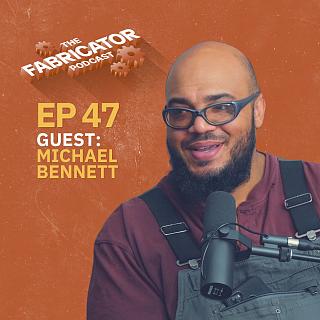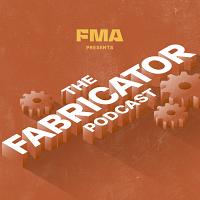Scrap metal art and overcoming obstacles with Michael Bennett
In this episode, Michael Bennett, a welder and metal artist based in Wadsworth, Ill., joins The Fabricator Podcast to discuss how an unfortunate car accident that left him paralyzed from the chest down reignited his passion for working with metal, particularly scrap metal.
Michael talks about how attending mechanic school helped instill a mindset of continuous learning and adapting to new technologies, which he says inspired him to relearn how use his tools after he lost strength in his preferred left hand. It also gave him the skills to build robots to help assist him around his farm.
He also goes into detail about his love of creating metal sculptures from recycled materials and how it led him creating Michael Bennett Designs and participating in an annual event in Lansing, Mich., called ScrapFest.
At the top, a mention of a now-banned plastic toy welder that Michael said he played with as a child, sparked a conversation about other banned toys made out of metal, like sharp-tipped lawn darts and a belt buckle revolver.
Email us at podcast@fmamfg.org with any comments, questions, or suggestions. Learn more about podcast sponsorship opportunities.
In This Episode
Learn more about the Manufacturers & Suppliers Event (MSE).
Learn more about FMA's 16th Annual Safety Conference.
Learn more about podcast sponsorship opportunities.
TRANSCRIPT
Michael Bennett: But it was like a plastic welding toy where you had these little sticks, these plastic sticks that you put into. It was like a drill, but then the drill spun and melted the stick, and you stuck two pieces together and there were cars that you were meant to weld together and then crash apart.
Dan Davis: No kidding.
Michael Bennett: And it's like on the banned kids' toy list. But that was one of the big things that got me into wanting to weld.
Lincoln Brunner: Wow. My first welder.
Sara Spring: Join us for the Annual Manufacturers and Suppliers Event in Schaumburg, Illinois on Tuesday, March 26th. At this one day tabletop event, you'll have the opportunity to network with fellow industry professionals and discover the latest production and manufacturing processes that can drive your business. The event will kick off with a keynote speaker from the Federal Reserve Bank of Chicago. Visit fmamfg.org to learn more.
Dan Davis: I'm Dan Davis. Welcome to the Fabricator Podcast.
Lincoln Brunner: I'm Lincoln Brunner, also of the Fabricator and the Tube and Pipe Journal.
Dan Davis: And thank you for joining us today. We have a good conversation with Michael Bennett of Michael Bennett Designs.
Lincoln Brunner: Fascinating guy.
Dan Davis: Yeah, a lot of energy, a lot of activity and conversation gets to a kind of a crazy place toward the end, so you want to sit through all of it. And part of that conversation was related to some of the toys that Michael had that kind of forged his interest in metal fabricating, and he was describing some sort of plastic play set that involved a drill bit that welded plastic pieces together.
Lincoln Brunner: Sort of like with a friction stir welding type of dynamic going on there.
Dan Davis: We couldn't find any evidence of such thing. I have no doubt that it existed because it sounds like the toys we all should grow up with.
Lincoln Brunner: Yes. Oh, my goodness. Endless hours spent with the Cox brothers in my backyard with jarts.
Dan Davis: Yes.
Lincoln Brunner: So fun.
Dan Davis: That's probably the best example of something that probably shouldn't be in the hands of people with alcohol.
Lincoln Brunner: Male chromosomes.
Dan Davis: Male chromosomes is a good way to put it. I have never come close to killing somebody with it.
Lincoln Brunner: Oh, awesome.
Dan Davis: Having said that, I'm not sure we ever had some at our house.
Lincoln Brunner: We had a full set of four, and we would throw them as high in the air as we possibly could, and we'd watch them come down. But I think it took just a modicum of eye hand coordination to avoid them. I don't think they were all that dangerous, but apparently some people were hurt.
Gareth Sleger: Here's some stats.
Lincoln Brunner: Ooh.
Gareth Sleger: Over an eight-year period, lawn dart sent over 6,000 people to the emergency room. 81% of those cases involve children, 15 or younger.
Lincoln Brunner: I stand corrected. Nobody in my neighborhood was ever injured-
Gareth Sleger: Mostly injuries above the shoulders.
Dan Davis: We were talking before the recording started wondering if any child kind had to live the rest of his life with a lawn dart in his head, because if they removed it would somehow affect his brain activity. We didn't find any evidence on the web. So if you know anybody that's walking around with a lawn dart in their head-
Lincoln Brunner: Send an email to-
Dan Davis: podcast@fmamfg.org.
Lincoln Brunner: Yes.
Dan Davis: This is the type of information we want.
Lincoln Brunner: Subject line, jart injury.
Gareth Sleger: We find out they still make lawn darts, but they just don't use sharp metal ends anymore.
Dan Davis: The phrase that pays is, blunt tipped.
Lincoln Brunner: We've established in this podcast that sharp metal objects are actually good things most of the time, but not in that case.
Dan Davis: Oh, you did find another one that caught your fancy, correct, Gareth?
Gareth Sleger: Yeah. The belt buckle cap gun. I think this was an item from the fifties or sixties, but it was like a little cap gun that would pop out of the belt buckle, but-
Lincoln Brunner: Wow. The Mattel Derringer.
Dan Davis: Yeah, I was about to say the Mattel Derringer.
Lincoln Brunner: Wow. The Fisher Price. My first firearm.
Gareth Sleger: 1959.
Lincoln Brunner: Mattel Toy Derringer.
Gareth Sleger: You can still buy them on eBay, so maybe you should get one.
Dan Davis: That's when goods were made better. Not only did they provide entertainment, it held your pants up.
Lincoln Brunner: And it looks like a darn fine Christmas item. That's what I'm thinking.
Dan Davis: Yeah. But nowadays, I'm not sure what's the threat there that you might get shot because you have a gun belt buckle or the fact that maybe the kid would swallow it.
Lincoln Brunner: The kid would swallow-
Dan Davis: I'm surprised everything in our society is not at least the size of a softball so that babies don't swallow it.
Gareth Sleger: We can buy a belt buckle cap gun for 250 bucks on eBay.
Dan Davis: That's pretty, I can't imagine the cap still work.
Gareth Sleger: No. Well, I don't know. [inaudible 00:04:46]
Lincoln Brunner: Did you have those cap guns that had the little strip of caps?
Dan Davis: Yes. It was not as much fun as I think I want to remember it.
Lincoln Brunner: No, they only smoked. They really didn't have a sound to them. It was kind of a little pop. That was it.
Dan Davis: I think in talking with Michael, he's the type guy who would just make his own-
Lincoln Brunner: Caps.
Dan Davis: Cap gun belt buckle. And so, that's the difference between why the people we interview seem to have much more fulfilling lives than I do. They can actually see their dreams come true.
Lincoln Brunner: They have a variety of interests that they entertain.
Dan Davis: They can make their dreams come true.
Lincoln Brunner: That's right.
Gareth Sleger: Michael had definitely a variety of interests. You'll learn what an indigo chicken is in this episode.
Dan Davis: Yes. Right.
Lincoln Brunner: Buckle up because he's got so many varied things just on his own property.
Gareth Sleger: Buckle up with your cap gun belt buckle.
Dan Davis: There you go.
Lincoln Brunner: There you go.
Dan Davis: That's a segue. So we think you'll enjoy this.
Sara Spring: If you need to stay up to date with the latest developments in workplace safety, then you won't want to miss the 16th Annual Safety Conference held in Elgin, Illinois from April 30th to May 1st. This event brings together industry experts to address emerging challenges and recognize excellence in safety practices. With educational sessions covering cutting edge developments, you'll gain the knowledge and expertise needed to ensure your workplace is safe and secure. Don't wait. Register for the 16th Annual Safety Conference and Awards dinner today@fmamfg.org. And now back to the episode.
Dan Davis: Michael Bennett of Michael Bennett Designs. Thank you for joining us.
Michael Bennett: Thank you guys for having me on.
Lincoln Brunner: It's great to have you.
Michael Bennett: Thank you.
Dan Davis: Tell us a little bit about yourself and your work.
Michael Bennett: I'd like to consider myself a local fabricator. Now it's more on tri-state area. I try not to travel too far. There's plenty of business out there.
Dan Davis: You're in northern Illinois, correct?
Michael Bennett: I'm in northern Illinois.
Dan Davis: Wadsworth.
Michael Bennett: Wadsworth.
Dan Davis: Which is, Lake County.
Michael Bennett: I'm mostly a recycled material artist nowadays, but I end up doing still a lot of big jobs. There's a season for every type of welding, I feel like.
Lincoln Brunner: What do you mean?
Michael Bennett: Every spring I end up getting jobs where it's like rocks come up out of the ground. It seems like I'm fixing tractors and I'm out just doing farm work, but then by the summertime, I move into a couple of driveway gates and a little bigger job. And also I set aside time every year to go back and forth to Michigan and compete in ScrapFest out there, which is a big part of my life now.
Lincoln Brunner: I wanted to ask you about ScrapFest. I noticed that on your website and your Instagram feed. Tell us a little bit about how you got involved in that, what that's all about?
Michael Bennett: A few years ago when Covid just shut down the world... Well, it was before all that. That was when I signed up for it, and then I was on pause for a year, but one year randomly, people had been telling me to go out there and I had free time. We had just sold my restaurant. And I saw that one of the main artists out there had made a giant elephant that moved when you cranked it. And I was like, I have to see this. It was kind of my style of artwork. It was what I like to do.
Dan Davis: That's Ivan Iler, right?
Michael Bennett: It was Ivan's. Ivan's big sculpture that's out there. And that was just unbelievable. So I hopped in. I saw that it was the weekend after, so I literally hopped in the car and just drove out there to see it. And then when I was out there, I was like, I have to be a part of this. It's like everything I do. So then that next year I signed up, which then everything was on pause for a year, and then we got back to it right after that.
Lincoln Brunner: Do you get sales and commissions from that?
Michael Bennett: The way that it goes, a lot of that's for charity, the big event. They list the sculptures there, so you can sell your sculpture, but just being there, you end up meeting so many people, and I get sales from there. And last year I had a booth, which I absolutely loved having the booth out there. It let me give some of my artwork to a lot of customers, and since I had a year in advance to really plan for it or to take my time, I was able to make affordable artwork that I was able to sell because I really wanted everyone to have something. And that turned out to be just as good as selling a sculpture. Which I do have my sculpture at home. There's a couple of people that actually want to purchase it at the moment, or they want to. But then I also have it on display. I'm trying to enjoy some of my sculptures too. Because I make so many things, and then literally as I'm painting it, I have to pack it up and ship it out.
Lincoln Brunner: Oh, wow.
Michael Bennett: Yeah, because there's a lot of things that just make sculptures and it's just down to the deadline, and I'm like, "Oh, I'll get it back after it goes on display or something." And then it ends up selling and I'm like, "Oh, well, there goes that one."
Lincoln Brunner: That's the double-edged sword. Being an artist, you love it, but you got to give it away.
Michael Bennett: Yeah.
Dan Davis: It's good to see that you actually want to spend some time with your work.
Michael Bennett: I'm at that point where now it's like, I really want to try to enjoy it because my property is in a nice location up in Wadsworth, so it would be nice to turn that into an open air sculpture garden. But then I'm trying to branch out to Door County as well, and that's real popular up there. So I wanted to start up an open air garden out there as well.
Lincoln Brunner: Door County is just wonderful for all kinds of artwork.
Michael Bennett: We just got a piece of property up there this last year, which for years, there's an excellent gallery up there, and people have been telling me to go up there. And I've wanted to put a piece up there, but I just don't travel up there. But now that I have an excuse to go up there, and I've been saying forever, I try to stay tri-state, and then now, it's like I got a piece of property up there. I have a nice little allay run throughout the year. I have my season.
Michael Bennett: So early spring and summer it seems like I'm out back and forth to Lansing doing the ScrapFest thing because I go out there. But then also, I also compete in this Midwest art initiative that's out in that area, which they do open calls for artists. That was one thing that was great because once it gets cold out here, I lock myself in the garage and practice, and all the sculptures that I've made, for my first year of ScrapFest that I was practicing for, I entered into that Midwest art initiative, and most of those sculptures went on rent. Those sculptures, a lot of them, are throughout Michigan right now, actually on rent. They're all throughout the Midwest, a little thing. [inaudible 00:11:13]
Michael Bennett: It's an open call for artists. You just send in your pictures, your information, and they put together a blind book, and all the cities just pick it, and they pick and choose, and they can rent or buy.
Lincoln Brunner: Oh, wow.
Michael Bennett: And it's nice because there's no name involved. It's pictures alone, so it's just purely your skill. So it's a nice little...
Lincoln Brunner: Oh, wow.
Dan Davis: What were some of your works that are making those rounds that can be found in Michigan?
Michael Bennett: The Lady in the Red Dress, she was actually on display up until last month, and her contract came up to an end, and then someone wanted to purchase her.,
Lincoln Brunner: Oh, wow.
Michael Bennett: So she just sold.
Lincoln Brunner: What's her name?
Michael Bennett: She was Lady in Red. She's kind of my fairy, which I want to make another one of her. Which I was actually thinking about making another one of her looking like she's going down on one of those whirly winds, those seeds, those little helicopter seeds.
Lincoln Brunner: Right.
Michael Bennett: So that's going to be one of the next sculptures I do. But then another one that I have on display is, I call it Fairy Birth, it's just a rose. That one's on display right now out in Michigan. I think it's on Falling Rivers Mountain Trail. I forget which town it's in... Or that one's right outside of Detroit. That's actually right outside.
Lincoln Brunner: How long does it take you to do something like that?
Michael Bennett: I think I kept track of the hours on that one. I try not to keep track of the hours.
Lincoln Brunner: Shit.
Michael Bennett: If you look at that, it's done in pieces.
Lincoln Brunner: Okay.
Michael Bennett: So when I do a lot of CNC plasma cutting, and when I have extra pieces on the sheet, instead of just throwing it in a scrap pile, I try to cut out butterflies and hearts and little fairies and things like that, because most of the time I can just weld that butterfly to a stick and paint it. And if I'm going to a flea market or a local artist [inaudible 00:13:00].
Dan Davis: Some of those small things.
Michael Bennett: Yeah. It's nice, affordable things that was already scrap metal and I pulled it out.
Lincoln Brunner: Maybe like 20, 30 bucks, something like that?
Michael Bennett: I try to sell them for that, or even $10. Depends on the crowd or the market that I'm at. Everything's really... Because flea markets sell things for almost half the price of a farmer's market. And people know it when they go to those places. You're like, well, I'm at a farmer's market. Let me pull out my $100. So I can go around and make my rounds and things like that. But I do try to just work with recycled material or material that I got for next to nothing. So I can do things like that.
Lincoln Brunner: Where do you procure your materials? Where do you go looking?
Michael Bennett: I've been local so long that a lot of people bring stuff to me.
Lincoln Brunner: That's great.
Michael Bennett: I tell people, as you're driving by, if you see old workout equipment or something on the side of the road, I'll take it. An old furnace. Because an old furnace that goes in your basement that people are throwing out, a lot of times that's at least eight square feet of metal a lot of times because it's just they're flat panels. They wrap around. So you just pull a panel off and I can throw that flat panel right on my CNC plasma cutter and cut out 30, 40 butterflies. But then also I get things off an online auction site, and I'll end up... Because big companies like Grainger and Uline, they can't sell products that are dented or scratched in any way. So they'll get full filing cabinets and big structural pieces of equipment that have nice structural steel that they can't sell because that has a little scratch on it. And I've gotten filing cabinets for $5.
Lincoln Brunner: No kidding.
Michael Bennett: Like the big ones that you put your coats into and everything.
Lincoln Brunner: Wow.
Michael Bennett: And those are big four foot by eight foot sheets that I just throw right on my machine just because one corner was dented out of all of them.
Lincoln Brunner: No kidding. That's kind of interesting.
Michael Bennett: It's amazing some of the material. And I do go that route because I hate that everything just gets thrown away nowadays, so it really brings, it gives things a second life.
Dan Davis: That's pretty cool. What are some of your favorite pieces?
Michael Bennett: Of course, those big wings that I made for ScrapFest, those are actually on display in Lansing.
Lincoln Brunner: Those are really sharp.
Michael Bennett: I have a traveling trophy that travels around Wadsworth. That was for a bowling league for The Duck Inn that's right down the road.
Lincoln Brunner: Yeah, I saw that.
Michael Bennett: So I like things that get passed around or that I know are going to be on display for a while. But other than that, I have so many things that I've made and even just forgotten about. I like that too because I go home and I'm like, "Oh, I forgot that I made that for you guys."
Dan Davis: So where did the Doberman sculpture come from?
Michael Bennett: A few years ago that polygonal art was starting to be super popular, and I was like, "Well, I want to do that myself, or I wanted to give it a try." So that was actually, all those pieces are hand cut and hand formed.
Dan Davis: Oh, wow.
Lincoln Brunner: Look at that.
Dan Davis: Obviously you've got a Doberman too, right?
Michael Bennett: I'm a Doberman guy. That was actually... I made that one, after my second Doberman passed. I'm on my third one. So my third one's Trinity, because it's the Holy Trinity, and I'm starting to just name them after numbers. Everyone from here on, I'm going to find the name of that number and find the name that I like of that number. And that's going to be it.
Dan Davis: That's beautiful dogs. Beautiful structure.
Michael Bennett: That's why I love them. I almost went to a rottweiler for a little bit, but they're a little boxy. Me being in a wheelchair, it works out, because a doberman, I like a big dog, but they're skinny still.
Lincoln Brunner: Right. Strong.
Michael Bennett: So when I'm in a hallway, the dog can just lean up against the wall and I can go by and I don't have to wait for the dog to move.
Dan Davis: And I might say sometimes a rottweiler might need to figure it out.
Michael Bennett: Yeah.
Dan Davis: [inaudible 00:16:37] necessarily recognize the moment before.
Lincoln Brunner: I was curious about your Ruth Bader Ginsberg sculpture. That was really intriguing.
Michael Bennett: Yeah, she's great, and I really need to do something with her. That's one that I've been enjoying. But then there's also things like, I wasn't quite happy with her lips at the moment, which I've remade them since the original video. Then there's those little things, that as an artist, you're like, "Ah, I'm not happy with it. I'm never going to send it out until I get that taken care of."
Lincoln Brunner: What gave you the inspiration? What drove you?
Michael Bennett: That was...
Lincoln Brunner: It's a lot of work.
Michael Bennett: She had recently passed, and there was all the stuff going on with all the voting thing, and every time you even turned on the news, it was this voting rights thing, this voting rights thing. So I figured it was a nice commemoration, and I've been wanting to work on my human form and do a big bust. So I figured I was going to do her. I wanted to do a big bust of my dad that had passed. Eventually, every person in my life, I want to do something like that at some point, but just also, it's nice to just remember people. I had a really good idea behind her and it's the two-sided-
Dan Davis: Interesting approach.
Lincoln Brunner: The justice hand and the...
Michael Bennett: Which I do like sculptures that kind of change as you walk around them. That one worked out real well, that you really don't even tell that it's a face until you get to the other side.
Lincoln Brunner: Right, right.
Dan Davis: So is that your first attempt at doing a human face?
Michael Bennett: Yeah. I've done a couple smaller ones and stuff, but that was the first attempt at just solely just human face. And that was 100% out of scrap metal. It's just out of my drop pile, so that's all drops.
Lincoln Brunner: Wow, that's all drops.
Dan Davis: Reuse those glasses on a Harry Caray statue.
Michael Bennett: Yeah.
Lincoln Brunner: What's the-
Michael Bennett: I have an extra pair because the first pair that I cut out, they didn't fit right, so I cut-
Dan Davis: I guarantee you if you need to make some money, there's some Cub fan out there that would buy one.
Lincoln Brunner: Oh, absolutely. The Cub fans were desperate.
Michael Bennett: Caray one would be great. He's got a lot of good form and stuff. That was part of the reason why I did pick RBG was, since she was older, got the jowls and...
Dan Davis: Right. Some faces are destined to be better sculptor candidates than others.
Lincoln Brunner: That's true.
Michael Bennett: It was something that had a lot of form to it.
Dan Davis: My head is perfect for just a round sheet.
Gareth Sleger: We're actually looking for someone to make a sculpture head of Dan.
Lincoln Brunner: Dan. I was going to say.
Dan Davis: You already [inaudible 00:18:57] off crows in your garden. Very multi-use.
Michael Bennett: People with beards. That's a unique thing too. You never know how to do the hair. And every artist does hair differently. Some people use wire, some people use cable.
Dan Davis: I imagine you get into something like that with some of your animals.
Michael Bennett: And a lot of times I like to use just the drops from those metal sheep shears to cut metal with the electric scissors. How you get that little curly cute that spits off.
Lincoln Brunner: Like you did with the fairy?
Michael Bennett: I have a couple of buckets of those that I save from doing jobs, and, it works out great.
Dan Davis: This is not a recent passion. You've had an interest in this for a long time.
Michael Bennett: I've always been a tinker in my whole life. Even when I was a kid, I was always just tearing things apart.
Lincoln Brunner: Taking machines apart?
Michael Bennett: Yeah. Never really put anything back together, which I had a teacher in junior and when I was in grade school, that he literally, I think it was just his distraction to get the kids free time and to leave them alone. But he had a corner of the room of just old appliances that you can just take apart.
Lincoln Brunner: No kidding.
Michael Bennett: And there were just a few teachers in my life that unknowingly just set me on that path. And even just a couple of little toys and things like that, they changed my life.
Lincoln Brunner: So he was cognizant of people who liked even kids who wanted to just mess with things and figure things out.
Michael Bennett: You knew that not every kid wanted to sit and read a book.
Lincoln Brunner: Right.
Michael Bennett: And part of his thing was he bought so many little hand tools, and then once they started disappearing, because we are kids and you drop things and things fall in pockets and whatnot. And he was like, "Well, if you want anything better, just go to the hardware store and start investing in yourself." So that taught me to start buying tools because there was one thing that I wanted to take apart that had the safety torques on it, and I was like, got to get that off. So I went and bought it. My first set of safety torques. I was just a little-
Dan Davis: How old were you?
Michael Bennett: I think I was maybe 10 or 11.
Dan Davis: That's pretty funny.
Lincoln Brunner: Wow.
Dan Davis: Saying I can't come to your house because it's got too many metal tools in the bag. So it's not safe.
Michael Bennett: I think the thing that got me onto welding was one of those kids' toys now, but it was like a plastic welding toy where you had these little sticks, these plastic sticks that you put into. It was like a drill, but then the drill spun and it melted the stick, and you stuck two pieces together. And there were cars that you were meant to weld together and then crash apart.
Dan Davis: No kidding.
Michael Bennett: And it's like on the banned kids' toy list. But that was one of the big things that got me into wanting to weld.
Dan Davis: That's awesome.
Lincoln Brunner: Wow. My first welder. Nice.
Michael Bennett: It really was.
Lincoln Brunner: Fisher Prince-
Dan Davis: [inaudible 00:21:34] sell those?
Lincoln Brunner: Probably not anymore.
Michael Bennett: They were on the market for a little bit when I was a kid.
Lincoln Brunner: If you bought one of those, you got a free set of jarts.
Dan Davis: There certainly was a time in toy development where there was a lot about breaking them apart and putting them back together. I remember that phase. I remember the home plastic welding kit, that sounds...
Lincoln Brunner: That's fantastic.
Dan Davis: That sounds pretty awesome.
Lincoln Brunner: I think they ought to bring that back.
Michael Bennett: I know. It's right up on the list with that...
Dan Davis: Jarts. Lawn darts.
Lincoln Brunner: Lawn darts.
Michael Bennett: Yeah, lawn darts.
Dan Davis: Jarts would be sold totally separate, but also dangerous.
Michael Bennett: But I think the other toy that got banned around that time was the one where you made your own little creepy crawlies in an oven.
Lincoln Brunner: Oh, yeah. Shrinky Dinks?
Michael Bennett: Yeah, but then you had this hot mold that you pulled out of the oven so every kid got burned.
Lincoln Brunner: That's good for you. Toughening up to get you character.
Dan Davis: A lot of good life lessons being learned in this.
Michael Bennett: I know. I think I got all the toys that were banned, but I absolutely loved them.
Lincoln Brunner: Well, speaking of making your own toys, you've got a very handy robot that you created. Tell us about that.
Michael Bennett: That was one of the first things I created after my accident, because my property wasn't nearly as accessible. It was always wet, so my wheelchair would get stuck in the yard. So I was going to get on this thing, which I do have a few pieces of yard equipment, but when you think about it, when you get on your tractor, you're always getting off to pick up a stick or move things, and then you're in that same predicament when you're in a wheelchair. But then your wheelchair's on the other side of the yard. So then you can't just hop off and grab one thing. So then I made the little robot, and it's kind of evolved into doing, it plows the whole driveway in the wintertime. All summer, it picks up sticks for me, and it moves heavy things. When I get material in, I literally have the material truck back up my driveway, and I just slide material onto it and then just drive it right into the garage.
Lincoln Brunner: Wow.
Dan Davis: There's a video here of it, just moving a full sheet of metal.
Michael Bennett: Yeah.
Lincoln Brunner: Tesla's got nothing on you, man. What's the battery life on this thing?
Michael Bennett: That has a couple of hundred amp hour batteries. So that under full load, when I'm actually plowing and stuff, I get about two and a half, three hours of work. But that's plowing wet snow and stuff.
Lincoln Brunner: That's heavy duty work.
Michael Bennett: Otherwise, really, I maybe charge it once a month if that.
Lincoln Brunner: Okay.
Michael Bennett: That's another little guy that... That's one that I'm going to just make into a wheelchair. But he does a lot of little jobs and stuff.
Dan Davis: Oh, that's like the base.
Lincoln Brunner: Is that Trinity following her-
Michael Bennett: Turn that into a base for a wheelchair. But I'm going to keep a lot of the lift arms and stuff because me, being in the yard, and fabricating, I do fall out of my wheelchair and it happens. So I want to make that. So it will help to pick me up.
Lincoln Brunner: Oh, wow.
Michael Bennett: I need to get into a more appropriate weight so I can just pick myself up. But I am also quadriplegic, so even though I'm mobile, best description for someone in a wheelchair is we're like a two-stroke. We got a power band where we're infinitely strong in that power band. But the second you get us out of it, we're useless. But as long as I'm in that power van, it's like I'm strong. I can do anything.
Dan Davis: You've worked on fences. Obviously you've got a video where you're on the back of a flatbed.
Michael Bennett: Yeah.
Dan Davis: You're not letting this thing get in your way.
Michael Bennett: No. And that flatbed I made for one of my friends, and he does a lot of tree processing, and that thing was great. I love that. That was a custom little job.
Lincoln Brunner: Look at that.
Dan Davis: That's awesome.
Michael Bennett: But then also, if I am doing things, I will just call him over and I'll be like, "Hey, let me just go in your flatbed real quick and then we'll pull up if things are out of my reach."
Lincoln Brunner: Oh, wow.
Michael Bennett: Which I do have a wheelchair that lifts me up like an extra foot or two, which that helps. I can do things that are about eight feet.
Lincoln Brunner: So speaking of the adjustments that you've made in your life, it seems like you've really got this full set of things that have just become part of your life that you had to adjust to.
Michael Bennett: They're essentials now. Before it was like, "Oh, well, I just need this little thing to help me out in this," which I don't let a tool hold me back. I don't go, "Oh, I can't do this job because I don't have that tool." I'll make the tool if I need to.
Lincoln Brunner: Wow. I love that.
Michael Bennett: That's my personality.
Lincoln Brunner: Michael, that's so great.
Michael Bennett: I'm built, not bought. It's like I can go out and buy a new car if I wanted, but I would rather make a handicap accessible car. Every winter I say, I'm going to start building a couple of my motorcycles or one of my trucks, and they're at the house and they're ready to get worked on. But then I start making sculptures. Typical fabricator. I bounce around at whatever is on my brain the most, which, it's nice because I have my life set up like that nowadays too. So it's worked out where I take so many decently paying jobs where I actually have to get up at four or five in the morning, get out there, do the work, but then after I get those jobs done for the year, I do whatever else I want. And at the end of the day, the bills are paid and I live within my means. I love it. It's a great life.
Dan Davis: Was this the path you were going to take regardless of the accident?
Michael Bennett: I think so. I'm pretty sure. Because I took the break for a while owning a restaurant with my mom. But that got me on the artistic path because either way I always wanted... It was always artistic, but it was artistic with, it had to be a car or a truck. I was very much in that box where I was like, "Oh, I'm only in chop tops, or I'm only going to do custom frame."
Dan Davis: That's a common thing we hear a lot.
Michael Bennett: It's nice that, when I was running the restaurant, I am not a person, like built, not bought. So I'm never going to get rid of a tool once I have it. I can't see going to a pawn shop and getting rid of something that has so many hours in my hands on. I can never get rid of. It's like a baby.
Dan Davis: Josh Welton, who writes a column for us, he wrote a column, I don't don't know how many years ago, that every tool he feels like has a soul.
Michael Bennett: They do. Especially hammers and stuff. You put so much energy into every swing that after a while it's like-
Lincoln Brunner: It becomes part of you.
Michael Bennett: It really does. It's just an extension of your body.
Lincoln Brunner: I have a hammer that I've owned for 30 years. It was the hammer I bought for my first construction job.
Michael Bennett: And it's like you pick up different ones, and even though it's the same handle, it's still different.
Lincoln Brunner: It's still different. You come to trust it. It's that muscle memory.
Michael Bennett: 100 percent. So yes, we took the break with the restaurant, and since I had all the equipment and the tools just sitting there in the garage, that's when I got really artistic with it. I had an English wheel. It was an affordable English wheel that I bought, and then I just beefed up the frame on it to make it actually a lot more sturdy. So it doesn't have the biggest upper dye, but it's still an eight inch. It's not like a 12 inch or anything. But just using those tools, I started just forming out, just to keep in practice too. Because after my accident, I always want to work on my projects. But when you're working on an old car, old fender or something that... You can't just go out and buy a new fender nowadays. And if you do buy a new fender, it's not the same. It's not the same thickness.
Lincoln Brunner: It's not the same material.
Michael Bennett: No. Old steel, you can't come across again. So there's some projects where it's like, I don't want to touch it until I do a little practice. And if I'm going to practice pounding something out, I might as well make something. So then I'll make a sculpture while I'm pounding it out saying I'm practicing and pounding on this fender. So everything works towards a common goal.
Dan Davis: I love you were telling us earlier where you went to school, and to me it's kind of exciting-
Michael Bennett: That last sculpture that you just pulled up, has to do with going to school. Sorry.
Dan Davis: Oh no, go ahead.
Michael Bennett: I made that around Game of Thrones. It was supposed to be my ice dragon before they unveiled them because how it was two years of the winter's coming, the winter's coming... So I was making that. But the cow skull that that's made out of, I actually found. So that's a real cow skull.
Dan Davis: Get out of here.
Michael Bennett: And I found that cow skull in Wyoming when I was hunting for antelope. Those are antelope antlers from the antelope I shot in Wyoming.
Dan Davis: Wow.
Michael Bennett: So that sculpture has tons of sentimental value.
Lincoln Brunner: Absolutely.
Dan Davis: You still have it?
Michael Bennett: Yeah, I still have it. That's one that I won't part with, but I have told people that I'll reproduce it with just a new cow skull. But I found that when I was trekking to hunt and shoot that antelope.
Dan Davis: How long did that stalk take?
Michael Bennett: Hunting out there is a little different since it's wide open.
Dan Davis: They can see it coming around.
Michael Bennett: A lot of it was driving around in a truck and then watching herds. And then once we found a herd we liked, we drove around. We planned out, you kind of flank them. So you plan out, you say, this herd's running this way. So we drive around the mountain or the hill, on the low side, and then wait for the herd to come around and just be sitting there waiting.
Dan Davis: Wow.
Michael Bennett: Out here in Illinois, it's like you set up a deer stand and that's your spot.
Lincoln Brunner: That's your spot, yeah.
Michael Bennett: Out there, you're going out and you're just watching the herds.
Lincoln Brunner: You're tracking herds.
Michael Bennett: You're tracking herds. It's more tracking than hunting, I think. It was a different experience first time with a rifle, rifle hunting, because Illinois, you can't do that. So that was great. I loved that.
Dan Davis: But you had a twofold education, not only?
Michael Bennett: Oh, yeah. It was completely twofold. So I would say if you're going to get your education, don't devote your life to just going to a school, but also try to get out of the box, out of your comfort zone, at least for a little bit-
Lincoln Brunner: Not just automotive, for instance.
Michael Bennett: Just not automotive, but just out of... Just go experience different elements of life and different aspects of life.
Dan Davis: Did you go there for strictly automotive and then take on metal fabricating?
Michael Bennett: I went there for... My mindset was, I took automotive classes in high school, so I was like, "Oh, I'm going to be a mechanic. I'm going to go to the mechanic school." But then they were like, "Well, you could also learn how to chop tops and do custom frames and build engines." So I was like, "Oh, yeah, I want to do that too. If I'm going to work on cars, I might as well." I already had a Jeep and the '66 Mustang, that was my very first car, which I still own it. It's at the house. It's in a shipping container. Eventually I'll get-
Dan Davis: Where was it going?
Michael Bennett: Huh?
Dan Davis: Where was it going, if it's in a container?
Michael Bennett: No, I put it in the container when I had to move.
Dan Davis: Oh, I got you.
Michael Bennett: Now I just leave it in the container until I'm going to work on it again. My son's 17 and he wants a project car, so we're going to probably pull that out and work on it for him. I was fortunate that was my first car, because I am 6'3", and my son's even taller. He is like 6'5".
Lincoln Brunner: Oh, wow.
Michael Bennett: And cars nowadays don't have legroom. So it's great having that Mustang because I had all the room in the world because it was a nice old open car-
Lincoln Brunner: Big floor plan.
Michael Bennett: Yeah, I absolutely love that.
Dan Davis: Nice. I remember there was Bill Cartwright played on the early 90s Bulls teams' first three championships-
Lincoln Brunner: Seven one?
Dan Davis: He had a Porsche, and I don't know whether it was a Porsche, it wasn't a 911, I forget what it was. But he had the front seat taken out, and he was actually seated where the back seat was, so his long legs could actually fit in there nicely.
Michael Bennett: Honestly, I wouldn't doubt that.
Lincoln Brunner: He had a short torso. He had long legs.
Dan Davis: He was legit long-legged 7'1" type guy.
Lincoln Brunner: Yeah, there he is.
Dan Davis: If anybody wants to do a Bill Cartwright impression, we'll start right now.
Michael Bennett: That shot that he had too, the overhead spin shot.
Michael Bennett: I can't even talk that low.
Lincoln Brunner: He talked like Cookie Monster.
Dan Davis: He did. So you're out there in Wyoming, you're learning both the skills on the fab and the automotive side. Did you really start to dig fab a little more?
Michael Bennett: I did, but then also the custom fabrication classes, in order to be able to work on your own car or anything in class, you had to pass all the welding tests. So the custom fabrication class, you learned about all the rear ends and setup up and everything, but 90 percent of the class was welding. You learning how to weld and put it down to good weld. And then once you passed that... So if you had perfect attendance, passed everything, the first month and a half of class, the last month and a half of class, you got to bring your car and do literally whatever you want.
Lincoln Brunner: Oh, wow. Nice.
Michael Bennett: So that was the good. But literally, if you were an hour late for class, that literally disqualified that last whole month and a half. So it taught you that wake up and get there. And then a lot of it was just sitting there and putting the grind in and the time and doing the welding test, because a lot of people nowadays, they're like, "Well, I want you to teach me how to weld." And I'm like, "I could teach you, but a lot of it is I'm going to send you home with homework." And the second they hear that, they're like, "Oh." I'm like, "Well, I'm not going to really have you on my welder until you can at least draw out a decent pattern or something." And you just explain that a lot of it is just putting in that time. But a lot of people, they don't want to do it nowadays. You can just go out and buy a cheap welder, watch some YouTube videos, and then put in the practice, and eventually you'll get it.
Lincoln Brunner: The thing that strikes me about you, Michael, is that you just don't sit still. You go and go and go. What do you advise people to do in that vein of learning and expanding yourself?
Michael Bennett: That was one thing, originally going to be a mechanic, one thing you learn is, you never stop learning. From day one, they tell you the technology is never just going to stop. You're always going to have to learn how new software, new updates. So it already put me in the mindset of, I have to keep learning throughout my whole life.
Lincoln Brunner: Absolutely.
Michael Bennett: I never had the mindset of, "Oh, I was going to put in my four years and then I was done learning." They told you right from the start, they were like, "Every year there's going to be something new on a car." And that mindset set has helped me because I taught myself how to program CNC and run CNC and operate it just by watching little videos and small educational classes without having to go through a whole. I didn't have the mindset of, "Oh, I need to go to a school to learn how to do this." The schools are great, and they help. And especially if you're trying to get into a very dedicated field, you do want that under your belt. But other than that, where there's a will, there's a way. That's where I go nowadays. I find a way around it.
Dan Davis: Has that attitude become more focused since your accident?
Michael Bennett: Yeah.
Dan Davis: And what exactly happened, if you don't mind sharing?
Michael Bennett: For sure. I owned a bar and restaurant years ago, and not really sure exactly. I met someone out at a [inaudible 00:36:13] place, just had a couple of drinks, and literally it was two drinks on my tab, and I woke up in a ditch an hour later. I could have had too much to drink, which I highly doubt that. But it was also around the time when people were popping pills in drinks, and I'm pretty sure, I think that's what happened. I don't know. By the time I was out of all my surgeries and everything, all my blood... They only hold blood work for a week. And by the time I was like, you could even talk to me, that was a week later because of the surgeries and in out of consciousness and whatnot. So ever since then, being in a wheelchair, there are tons of people that will help you and help you figure it out.
Michael Bennett: But then that also comes with lots of doctor's appointments and things take time, and I didn't have time to really sit at home and wait for someone to make something for me when I knew that I could make it myself. And I had a garage full of tools. So it was just going out and just retraining myself how to use my tools again. It did take me a while. It took at least I would say a solid two to three years before I could really even hold onto a grinder.
Lincoln Brunner: Oh, wow.
Michael Bennett: Because I do everything with one hand, and I used to be left-handed.
Lincoln Brunner: Get out of-
Michael Bennett: So now, I'm right-handed. But also just the fact of rebuilding that muscle because this hand's supposed to be paralyzed, so I had to relearn that. And then grinders, they spin it at 3,500 RPM. So at first, that first robot I made, all the cutting and grinding and stuff, that was with a drill because the drill's lower RPM, and I was able to grip onto it with two hands whenever I was cleaning up something. And then I'd also use a sawzall instead of a grinder. The sawzall is a little easier to handle.
Lincoln Brunner: Sure.
Michael Bennett: So whatever tool's going to get the job done, I didn't have the mindset of, I had to use chop saw. Just to cut this one piece.
Dan Davis: What were some of the first things you jumped into? Was it to help your wheelchair situation or it was looking for an outlet?
Michael Bennett: It was mostly to help the wheelchair situation. As an outlet, I do a lot of stuff with a sports program. I was making stuff to help them out too, because just little things here and there, like little tabs break... And you just have to do little modifications constantly because life isn't one size fits all, and unfortunately, they try to make the wheelchairs so one size fits all, and they try to make them adjustable, but everyone does different things, and you have to have a wheelchair that's meant for you. I have three backup wheelchairs, but this is the one I'm in every day because it works out best for me.
Dan Davis: Right. [inaudible 00:38:51] And looking, you got one armrest that looks strictly like you fabbed it, right?
Michael Bennett: Yeah. The whole top half of this wheelchair I made. Okay.
Lincoln Brunner: That's heavy duty. It's welded and...
Michael Bennett: And almost, it also looks like I'm just poured into the wheelchair because since I'm doing jobs and stuff and I have to get in between things, there's times where this little tiny wheelchair just gets in there a little bit better. It's not the most stable in my wheelchair. So there are ones where it's like if I have to move a big piece of material across the shop, sometimes I will hop into another wheelchair just because this one, if I'm going backwards and holding on, I can pull myself out of my chair and I could tip over rather easily.
Dan Davis: Man, rough and tumble.
Michael Bennett: Yeah, unfortunately.
Dan Davis: So with the wheelchairs you have, how many do you currently use? You mentioned some older ones that-
Michael Bennett: I have probably three that are in steady rotation. One that I keep for weddings. This used to be the wedding chair, it was the nice one.
Lincoln Brunner: The wedding chair.
Michael Bennett: This one's turned into a work chair. I do keep one that I try to keep nice and spiffed up and polished and ready to go out to events.
Lincoln Brunner: Nice.
Michael Bennett: But my life is work and how I said it, I get up and... I move every day. Unfortunately I don't move as fast as I used to, so I just get up and you just do something every day. That's just a lot of it. Because it's easy to get into a cycle where you're just sitting there doing nothing.
Dan Davis: But I think, your work speaks for itself. But actually the videos behind it show you the creativity-
Michael Bennett: I need to get-
Dan Davis: Passion and the dedication to making it work.
Michael Bennett: I need to get a little bit more into the video side of it. I've been telling myself for a while that I need to sit back and actually start producing some more videos.
Dan Davis: It's time consuming.
Michael Bennett: It's time-consuming, and that's a whole another side to it in itself.
Dan Davis: We hear a lot of fabricators who want to do that, promote more of their work via Instagram or TikTok with video, but they get so into their work, they completely forget about the process of trying to promote it.
Lincoln Brunner: Right. And a lot of them who have really great Instagram pages have someone else, dedicated to shooting those videos and doing it. Very few people who have time to do both.
Michael Bennett: Which a lot of them that I know, there are a few fabricators I meet, and that's one of the first things I always give them props for, is their social media side. And a lot of times it's their significant other, their wife, or even nowadays, it's going into their kids and stuff, which I wish, my son's really dedicated with school. And this time of year, he is in wrestling and everything. But it would be great because he wants to start a YouTube channel. So if he starts coming over and doing videos, it's like-
Dan Davis: That's probably. Great way.
Michael Bennett: He wants to do his own stuff, but all the stuff he wants to do, it's something that's in my alley too. He always wants to make a sword or something like that.
Lincoln Brunner: [inaudible 00:41:45] Me a sword.
Michael Bennett: Which I don't do as much forging as I used to. So the only time I really do fire up a forge or really heat up some metal to really pound on it is when my son or someone else is around, because having just one hand that works. I have an attachment that I put on my left hand. It's like a hammer. It's like a hammer glove. I made it originally, so I can attach hammers to it, but it's so beefy in itself. I really just kind of use it as a hammer. That ends up, I have my tongs with one hand and then just a hammer with the other one.
Dan Davis: So how are people finding you now? Are you getting some traction from your Instagram feed?
Michael Bennett: I get Instagram traction and everything, but honestly, I get traction now from probably, I think, I've been so local in the same area for so long. That enough people-
Lincoln Brunner: Lot of word of mouth.
Michael Bennett: A lot of word mouth. People know me from my area and how I said I'm kind of tri-state now. I've done farmer's markets and flea markets enough, where I think I've just been out there enough. I tried Etsy for a while and things like that. And one weekend at a farmer's market is almost a year's worth of Etsy sales. At a good farmer's market.
Lincoln Brunner: Wow.
Michael Bennett: We choose different ones. You pick and choose your market and you know the price bracket once you get into it, but there are big events and stuff out there where it's like you can go and make five grand in a weekend.
Dan Davis: Does some of that activity translate into bigger projects? People know that you can-
Michael Bennett: Yeah, because I end up selling a lot of just small little knickknacks at farmer's markets. I take a couple of big things that are higher price items, but then the things that sell, that pay the bills, are the little things.
Lincoln Brunner: The butterflies.
Michael Bennett: Yeah. But then, at least every other week someone comes and they're like, "Oh, I just bought a house. Can you do an address sign for me?" Or something like that. And I get a lot of business just by doing just little things like that. They'll see, I have little butterflies for sale. And they're like, "Oh, could you do a big three-foot one?" I'm like, "Oh, of course, I'll have it next week for you." So I got a lot of just turnaround business by that of just making myself available and letting people know that.
Lincoln Brunner: Woody Allen's old line. "90% of success is just showing up".
Michael Bennett: It really is. I make it in the habit of, as far as getting material, I don't say no to people. Like people bring by an old grill or something, and I'm like, "Thanks for the grill man." Which a lot of times it's like I end up just throwing it in the scrap pile, and then once or twice a year I have a guy come and just come and clear out the pile. But then that same person will bring back something really nice or unique at one point. But if you said no to them for the grill, they're not going to think about you the next time.
Lincoln Brunner: Speaking of grills, I noticed you had a couple of canisters that you made into jack-o-lanterns on your page. Just really creative stuff like that. Is that something you wake up in the morning and go, "Oh, I think I'll do a couple of jack-o lanterns." Or is it something you plan out a little bit better?
Michael Bennett: The one nice part about social media is there's those trends and you see things all over the place. So then they're like, "Oh, well, I guess I'll do that social media thing today or something." But the jack lanterns, I was doing a while before those were even really popular, but it's like everything has its season. So after you get one or two cold days in the summertime, I'm like, "Oh, I need to start thinking about fall merchandise." And since I'm so local, [inaudible 00:45:17] those canisters, I get a lot of those canisters from the Petting farm down the road-
Lincoln Brunner: The petting farm.
Michael Bennett: Because people have birthday parties there, and those little disposable helium canisters that they buy at the place to fill up their own balloons, almost every birthday party comes with one or two canisters. And then he has five or six parties a week.
Lincoln Brunner: Gosh.
Michael Bennett: Since I've been around, he makes it a point. He's like, "Oh, Michael, keep these." Then he will have a whole room. And he just calls and he is like, "Hey, I got a room full of canisters. You want to come and get them?"
Lincoln Brunner: Nice.
Michael Bennett: It works out great.
Michael Bennett: One thing that caught her eye was the Bud Light Sharks. Those guys are super popular. I started making those because all my drop steel that I had. For a while I had the restaurant and I hate waste. And having a restaurant, there's all the glass waste. So I was making a lot of light equipment from old liquor bottles. So I have a few hundreds of bottles just saved from when we had the restaurant. Anyone can just go down the road to your local bar, and they throw away garbage cans full every night of bottles. And a thing that irritated me was, the recycling company only recycles the clear ones.
Lincoln Brunner: Really?
Michael Bennett: So when you're paying for a recycling service and they just go and they're throwing away half of it anyways. So I was like, "Let me just hold onto these." And then-
Lincoln Brunner: The green and the blue and the dark-
Michael Bennett: And they're all good colors and nice shape. So even when I'm out at the store, I'll purchase something just for the bottle nowadays.
Lincoln Brunner: Oh, okay.
Michael Bennett: Because I'm like, "Well, I'll be able to make the money back off of it." But all those fish are made 100% of my drops. So on the plasma cutter and stuff, if I didn't cut out, you always end up having a pile of just scrap.
Dan Davis: So do you have a tube cutter for your plasma?
Michael Bennett: For cutting round stock?
Dan Davis: Yeah.
Michael Bennett: No, that's actually flat. Even though-
Dan Davis: I was looking more at the shark, it seemed like there was a tube in to it.
Michael Bennett: Oh, no. I have just a nice cheap little three in one press slip break. So I take them and I do a bunch of little jagged shark teeth cuts, and then I just roll them through the slip roller and puts a nice curve on them.
Lincoln Brunner: Nice.
Michael Bennett: I love my little slip roller. It works out great, especially I'd use, the little butterflies. I roll them through it. Butterflies are half circle, and then I just bend them in the middle.
Lincoln Brunner: Did you build that yourself too?
Michael Bennett: That I modified it, but-
Lincoln Brunner: Of course you did.
Michael Bennett: I just go and buy a cheap one. But most of my tools are modified, especially nowadays, being in a wheelchair, I had to buy a brand new drill press a few years ago, and I hated it. I literally went out... I needed a good one, so that could actually handle doing some work. But then all of them are on bases, and all the bases were already too tall for me to really operate in the wheelchair. So I had to go out and I bought like a $1,000, $1,200 drill press, and I instantly had to cut it in half.
Dan Davis: Oh, wow.
Michael Bennett: So it's hard to buy a new tool and just... Because the base was already too tall, but I needed something that could really handle the force that I needed it to.
Lincoln Brunner: The world's not customized for people like yourself.
Michael Bennett: No, it's not, which, I mean, a lot of people do have wheelchairs. You can stand up, but unfortunately, if it's not convenient, you're not going to use it. So you can have all the tools in the world, but if that tool's a pain in the butt to fire up and get all your settings right, you're not going to use it nearly as much as you should.
Dan Davis: More expedient to cut it to size as opposed to trying to build some kind of platform or something around it.
Michael Bennett: Rather than saying, "Oh, I'll just hop into this wheelchair every time I want to use this tool." It never really works out.
Dan Davis: I find the gates and stuff... Because where you live, you mentioned one of the highest per capita areas for horses.
Michael Bennett: Yeah.
Dan Davis: There's a lot of outdoor theme work you're doing.
Michael Bennett: And it's a lot easier to get into someone's yard, front yard or backyard, as opposed to their house. So if you're trying to make artwork, it's easier for someone to come and just stick something in a flower pot and then you go from the flower pot to the front driveway, and then from the driveway, they're like, maybe it's making a mailbox or a gate, and then you work your way up. But it is hard to get art work in people's houses. So that's where I started making driveway gates and things like that. And I get a couple of those a year and it works out.
Lincoln Brunner: Okay.
Dan Davis: Sheer size of then's fairly impressive, but you're able to make it work.
Michael Bennett: It's really, it's take your time, piece by piece, always. I have my little robot that moves pieces around. Those gates do get a little heavy for him, so I end up using a couple engine hoists, and it's like a acrobatic acts with any noise-
Dan Davis: You get the robot to pull the gate attached to the engine hoist?
Michael Bennett: Whatever. I used to just sit there and muscle it with my wheelchairs, but then I'd end up breaking the wheelchair here and there. So it's like if I'm going to break apart on something, I'd rather break it on that and I can just go and easily fix it. But that was my latest gate, and that's actually at my new house that we ended up moving to. That's right off the 41. But I love that scene. Everyone in the family picked an animal for that one.
Dan Davis: Which one's yours?
Michael Bennett: The owl was mine because when we were first planning it was in the wintertime. There's always owls. My mom picked the deers. My brother was the wolf. There's a little turtle down there in a lake. Those are the grandkids. And my son picked the falcon. There's a falcon hiding in there.
Gareth Sleger: Did you always grow up in a rural setting that inspire some of this, forcing yourself to work with [inaudible 00:50:55]?
Michael Bennett: The area I live in, it's rural, but it's not. I love the area. We're dead center between Chicago and Milwaukee, and it's just center enough where things kind of get country for like five seconds and then you're back right into Six Flags or Gurnee or something like that. So the little town I'm in, it's like a farmer state town, so you can't have a house unless you have at least an acre of property. And most of the town originally was sold in two and a half to five acre plots. So it is like a little country area, and everyone does have horses because in order to have a horse, you have to have so many acres, just livestock in general.
Lincoln Brunner: You don't want to have a two bedroom apartment with a horse.
Dan Davis: Oh, we got to send the horse back.
Michael Bennett: But also, under the same fact, there are a lot of people that have apartments that live in the city that still want horses. So we're the area for that. So everyone boards their horses up by us. That's how we have that horse density population. Since we're close to the city-
Lincoln Brunner: I don't think we've had a conversation about horse density in this podcast before.
Dan Davis: That's why I brought it up. I've found it very interesting.
Michael Bennett: I would think that Northern Illinois has some of the densest population of horses in the whole country, right there.
Lincoln Brunner: You think of Kentucky or you think of... Like you said-
Michael Bennett: Whichever area has their staple on horses. Up here we are the Jumping Lipizzans, and you go down to Kentucky and you have the Tennessee Trotters, the horses that do the fancy dance when they're walking. And that's what they're popular for. In upstate New York, it's like all horse racing.
Lincoln Brunner: Thoroughbreds.
Michael Bennett: I'm not really on that side, but horses in general, it's thoroughbreds. It's a lot more semantics than I like to get into. I like to just make stuff.
Lincoln Brunner: [inaudible 00:52:31] the horses of somebody else.
Michael Bennett: I'm not tracking bloodlines and stuff. That's too many splitting hairs for me.
Dan Davis: I was about to say, that's a whole another income level too, when you get involved with that.
Michael Bennett: That could be it too. I'm just not a-
Dan Davis: Feeding a doberman is enough expense, I imagine.
Michael Bennett: She runs around like a horse already. My little pony.
Dan Davis: Do you have other animals?
Michael Bennett: Quite a few. I have two goats. I have a couple of barn cats. They're great. Every animal has its place. And then I have 12 or 15 ducks now. I have 10 chickens. They're supposed to be giant chickens. We'll see. It took me all year just to get them up here. They're from South America, but the chickens get to be three to four feet tall.
Lincoln Brunner: No kidding.
Michael Bennett: They're already about two and a half feet tall, and they're about six months old.
Dan Davis: That's pretty sweet.
Michael Bennett: They're called indigo giants.
Lincoln Brunner: That's a meal. What in the world?
Dan Davis: Gareth's going to call up a picture of the San Diego chicken.
Michael Bennett: They're a little more stretched out.
Lincoln Brunner: Three to four feet tall?
Michael Bennett: I was hoping that it would look like I have a bunch of raptors running around.
Dan Davis: I was about to say, right?
Lincoln Brunner: I guess so.
Gareth Sleger: These are a little bit more [inaudible 00:53:37] out a little bit more.
Dan Davis: That's crazy looking.
Michael Bennett: They're a lot more leg and neck. And when you actually look at their skeletal structure, they look more like a raptor than anything.
Lincoln Brunner: Wow.
Dan Davis: Look at you, bringing science to Illinois. I'm sure you're getting the eggs. They're typical chicken, right?
Michael Bennett: They still lay eggs and stuff, but I'll probably end up patching them. But I do still eat the eggs. Because my ducks lay eggs.
Dan Davis: I was about to say duck eggs are pretty good.
Lincoln Brunner: Duck eggs.
Michael Bennett: I try to stick to, I don't want to say I have a boutique petting farm, but I try to stick to rarer animals, are more unique. The ducks that I got, they're Indian runner ducks, so they're not the fat white duck that's at the pond. My ducks are running around my yard. We're on-
Dan Davis: They're pretty lean?
Michael Bennett: Yeah. They're real lean. They travel in a herd.
Lincoln Brunner: Do you have races?
Michael Bennett: They're the ducks that they do use in the races.
Dan Davis: [inaudible 00:54:31] Really trying to make a joke, and it's true.
Lincoln Brunner: I'm trying to make a joke and it's true.
Michael Bennett: They're the ducks that they use in the races, but actually I originally hatched some and they're like pets. And this last spring I hatched a bunch and I just let them go wild in the yard in the back pond. So it's literally like I have a wild herd of these ducks that just run around the yard. It's really entertaining.
Dan Davis: They'll stick around during the winter?
Michael Bennett: Actually, I just got them all in a coop area for wintertime, just because the pond does freeze over. We have an aerator and everything, which they could probably survive. But also-
Lincoln Brunner: You don't want your pets migrating.
Michael Bennett: No.
Dan Davis: That chicken's something else, man.
Michael Bennett: So I'm pretty excited by spring time.
Dan Davis: Right?
Michael Bennett: By the springtime, I'm hoping, I have a yard full of raptors running around, so if you fly over in a helicopter, it'll be like Jurassic Park.
Lincoln Brunner: Right there in Wadsworth.
Gareth Sleger: You should make a Jurassic Park gate.
Michael Bennett: Yeah.
Dan Davis: With chickens though-
Michael Bennett: Entry.
Dan Davis: You know what? I'd watch that movie. I'm sure that there might've been a movie on sci-fi channel already though.
Lincoln Brunner: Like the big indigo chickens?
Dan Davis: Sure.
Michael Bennett: I'm really excited. It took me a while to get them. I got them actually a little late in the season. They're only six months old going into a winter, so they don't really have that meat on them. So I will have to make sure that the garage is heated, but I have a wood burner in there anyways, and I'm already out there fabricating.
Lincoln Brunner: Honestly [inaudible 00:55:46], those things are fearsome.
Gareth Sleger: This is pretty good security for the property too. If I saw a group of these walking around, I would be gone.
Michael Bennett: That and then-
Lincoln Brunner: UPS man? No problem.
Michael Bennett: And everyone's chicken people now, and one big problem when you have chickens is, there's a lot of predators. There's a lot of hawks and stuff around here. So I'm hoping-
Lincoln Brunner: Ain't no hawk that's going to mess with that.
Michael Bennett: That's what I'm hoping. It's just the sight of one of these. When a hawk flies over hawks and hawks are like, nevermind.
Dan Davis: [inaudible 00:56:12].
Gareth Sleger: Are these legal to have them in the United States?
Michael Bennett: They haven't banned them yet or made them exotic. That was my whole thing. Part of my reasoning too, it's like everyone likes those emus that are on the commercials.
Dan Davis: Emus are dangerous.
Michael Bennett: They're dangerous and they're classified as exotic, but people want that big bird. And most towns, you have a chicken.
Dan Davis: I was about to say, as long as you can eat them.
Michael Bennett: So this is about the closest thing I can get to an emu and a chicken.
Lincoln Brunner: This is a good cross.
Dan Davis: Let's not equate this with the Burmese python situation.
Lincoln Brunner: No.
Dan Davis: [inaudible 00:56:44] Temperament. I'm perfectly willing to have this animal as a next door neighbor.
Michael Bennett: These guys, they act just like a regular chicken. So they have a pretty good temperament and they're pretty friendly so far. They don't have those big talons like a-
Lincoln Brunner: They don't?
Dan Davis: What is that thing called?
Michael Bennett: I haven't really seen any with them yet because those [inaudible 00:57:02] and stuff, some of those chickens, they grow those spurs, and that's always a big issue with, especially South American breeds in general. It's just they're defensive, which it's a good natural thing to keep them safe when you're trying to keep them as a pet.
Lincoln Brunner: Yeah. That's so great.
Dan Davis: How many roosters do you have?
Michael Bennett: Since I did hatch them myself, it always ends up you have way too many males. So I have at least three or four, but since these are a new pet to the area, once they're full-grown, I'm probably going to end up just selling the roosters because no one else has them.
Dan Davis: Right.
Michael Bennett: I think the closest farm to me that has these is in Tennessee.
Dan Davis: No kidding. That's interesting.
Lincoln Brunner: That's nowhere close to Wandsworth.
Michael Bennett: Yeah.
Dan Davis: Lose you without a map. [inaudible 00:57:46] clarified. It is not near Illinois.
Lincoln Brunner: I'm a geographic specialist here at FMA.
Dan Davis: You've learned all sorts of things on the Fabricator podcast.
Michael Bennett: I kind of bounce around every direction. Even though I'm welding all year, I'm doing tons of other things, and a lot of it was thrown in my lap. A few years ago, I moved my grandparents' house. It was a better living situation for me. And the house pays its own property tax because it has rental properties on it. Which it works out better for me career wise too because I don't have to go out and chase that bare minimum. But the house also has like 90 fruit trees, that my grandpa planted his whole life, so I take care of the orchard for that.
Dan Davis: Oh, wow.
Michael Bennett: And that's where the robot comes in handy. All the little attachments and the bed. Because I end up filling it with branches. I do have a lawn mower attachment for it. I don't really use it as often as I used to, but...
Dan Davis: And you're able to use the fruits to feed a lot of this?
Michael Bennett: So the fruit, a lot of the fruit I've been just making alcohol with.
Dan Davis: Serious? Just wait up. Just for clarification, once again, we're in Illinois, not Tennessee.
Michael Bennett: I'm just making wine and stuff, and I do run a little bit through the Whoopty Woo and make some hard liquor, but not as much. It's mostly just wine.
Dan Davis: [inaudible 00:59:03] the next episode we come visit the Whoopty Woo. We should have been going to your property.
Lincoln Brunner: I don't think you should be coming here, man. [inaudible 00:59:10]
Michael Bennett: Have a little bit of everything up there.
Lincoln Brunner: I want to see the chickens. I want to see the fruit trees. I want to see the liquor still.
Michael Bennett: And part of the thing that makes us a farm technically is having bees. So we have bees, and you wouldn't think that having just a couple of beehives would do much, but I got 70 pounds of honey this year from that.
Dan Davis: Wow.
Lincoln Brunner: Good grief.
Dan Davis: They must be worker bees.
Michael Bennett: It's a lot more than I would ever do within a year. That's why I make the alcohol, but I also give so much away. But with the fruit trees, they do help feed the chickens, and I end up feeding a couple of pigs down the road. And then some of the farmers, they give me some meat kickbacks usually in the wintertime.
Lincoln Brunner: That's awesome. You are one busy man. I love it, man. It's great.
Michael Bennett: I have to get up and keep moving every day. That's what I said. It's easy to be idle, especially nowadays with, I even find myself just staring at my phone. It's hard to not stare at your phone, especially when you're trying to be part of it too. So it's like you go just to do a small update and you find yourself looking at videos for five minutes.
Lincoln Brunner: Five hours, some people.
Dan Davis: No, it's good. It's good to keep that in mind though. I think somebody that wants to make it happen is you've actually got to have something to share.
Michael Bennett: And especially since I do a lot of the sculptures nowadays, I get a lot of inspiration too, just from being in the yard. Because every spring-
Lincoln Brunner: Well, your yard especially.
Michael Bennett: I have all the fruit trees, and so every spring, the yard's got so many flowers and stuff in it. I get a lot of inspiration from that. The Lady in the Red Dress, her dress, the flowiness of her dress was kind of, when you see a bunch of flower petals flying around in the wind and you get caught in that little tornado of them. That's where I was going with that a little bit.
Lincoln Brunner: The motion that's connotated by that sculpture is very cool. The hair and the dress.
Michael Bennett: That's where part of that inspiration came from. It was just, I think I was out in springtime and there's a gust of wind and just took a bunch of cherry blossoms off the trees and I was like, "Oh, I want to make a blossom tornado." Which I still want to do something like that. I just haven't gotten into it. But I think it would be cool to make just like a whole tornado of when you're just caught in that spiral. Even when you're randomly in a baseball field and there's that dust storm around you.
Lincoln Brunner: Sure.
Michael Bennett: I like recreating stuff like that or trying to, so it looks like it's moving when it's not.
Dan Davis: So what are you bringing to ScrapFest this year?
Michael Bennett: Ivan does a lot of moving stuff, and I like to have people really like the sculpture. So instead of even just going for first, second, or third, I think the best in show is my thing that I want to try to go for every year now, so I'm going to have to really bulk up on my mechanisms throughout the winter because I want to try to make something that moves, I think-
Dan Davis: Something more kinetic?
Michael Bennett: Yeah, something a little bit more kinetic. I usually make things that move in the wind, but I'm going to have to... I'm probably just giving myself away at this point, but I think I'm going to make a-
Lincoln Brunner: Don't listen.
Michael Bennett: I think I'm going to make a dinosaur next year. I'm thinking about a T-Rex, and then when you step on the platform, it's head moves and stuff.
Lincoln Brunner: You got plenty of inspiration right in the yard with those chickens.
Michael Bennett: Oh, yeah. I have my little raptors and stuff running around now.
Dan Davis: A giant indigo chicken.
Michael Bennett: I could do that.
Lincoln Brunner: People wouldn't believe it.
Michael Bennett: People like giant chickens too.
Dan Davis: I agree. But I think if you make one like that, I don't know if they'd quite believe it's a real thing. They think it would be an artistic take on a chicken. This is my commentary on how the chicken evolved into, or a raptor evolved into a chicken as opposed to... Yeah, this thing walk around my yard right now.
Lincoln Brunner: I don't think that thing's evolved. I think...
Michael Bennett: You always see those videos where people are like, "Well, I took this and I took that and we made this." I was thinking about doing one of those. It's like, "Oh, yeah, I was digging my backyard and dug up this fossil. So I decided to inject it into an egg and this is what we got."
Dan Davis: That might be the way you build up your social media following.
Michael Bennett: That's right.
Lincoln Brunner: Look what I found in my yard. Do you have this in your yard? I don't think so.
Michael Bennett: I just have to get myself to be lighthearted like that on social media. It's hard. It's one of those things, getting yourself out of the box. You have that comfort box that you're in.
Lincoln Brunner: You get on your phone all the time. You're putting yourself back into a box.
Michael Bennett: You do. It's hard. It's one of those things. And then also just being a fabricator and a welder. Metal's cold. It's hard to bring out the lighter side of it.
Lincoln Brunner: It's hard. It's cool.
Michael Bennett: It's hard. It takes a lot of work to make it look soft.
Lincoln Brunner: That's a good point. Cool. Very cool.
Dan Davis: Anything else we want to cover, Gary?
Gareth Sleger: No, we covered more than I could even imagine.
Lincoln Brunner: I don't think we've had anybody else who's going from cherry blossoms all the way up to Ruth Bader Ginsburg.
Michael Bennett: And then even on the automotive side, it's like we were talking about project cars. As I said, I always have projects. I have a few motorcycles. I own almost every car I've ever bought still. I have a '91 Dodge. So I'm going to build us a little farm truck. I have a '39 Plymouth, which I originally got the Dodge because it had the same wheel base as the Plymouth. So I was going to pull the body off the Plymouth and put it on the frame of the Dodge. So easier to title and just instantly have a vehicle I could drive because the Plymouth has suicide rear doors, so it'll be easier to get the wheelchair inside. I have a million projects. Eventually I'll get to everything, but I also, when people ask why don't I just go out and just buy a brand new handicapped car? I'm like, "Well, I'm waiting for me to go crazy. My forties or my-"
Lincoln Brunner: Midlife crisis.
Michael Bennett: Midlife crisis.
Gareth Sleger: You can say it. It's fine.
Michael Bennett: I just forgot. I don't even know how I forgot that, but I'm waiting for my midlife crisis to build all my cars, I think.
Lincoln Brunner: I'll tell you what, man-
Dan Davis: Look, if you build something with suicide doors, make sure you get it on social media.
Lincoln Brunner: And call us because we are both in [inaudible 01:05:00]
Gareth Sleger: We're definitely having you back on the podcast.
Michael Bennett: For sure.
Lincoln Brunner: We need more like you.
Michael Bennett: I expect to let you guys know once I get going on some of these. The motorcycles, I'm probably going to throw a side-car on one of them. One, I might make into a trike, but I want to do the newer style with the two wheels in the front.
Dan Davis: Like those Can-Am things.
Michael Bennett: Almost like a Can-Am, and then I can pull my wheelchair in, just hop over.
Lincoln Brunner: Make your own slingshot?
Michael Bennett: Yeah.
Dan Davis: I imagine it's safer just in general.
Michael Bennett: That's one thing too. I don't really have the balance that I used to. And even on a trike, on a motorcycle trike with the wheels in the back if you're going around a turn, if you're not inside that triangle, it's like you flip.
Dan Davis: Man, I'm old enough to remember when they used to sell those three wheelers-
Lincoln Brunner: Three wheelers. Oh, those were-
Dan Davis: There was a reason they stopped selling.
Michael Bennett: Five minutes on a three-wheeler, and you're almost like me.
Lincoln Brunner: I remember being on a three-wheeler and feeling how unstable that was. Even at 20 miles an hour, that was-
Dan Davis: It was something else.
Lincoln Brunner: They were not stable.
Dan Davis: Wow. Well, where can they find you on social media?
Michael Bennett: michaelbennettdesigns.com. Otherwise, on social medias, it's handicapmade100 on just about every social media.
Dan Davis: Awesome. Thanks for joining us.
Michael Bennett: Thanks for having me on. It's been great.
Dan Davis: Thanks, guys. If you have any questions, comments, or complaints, send them to podcast@fmamfg.org and please go to where you get your podcast to rate, review, and subscribe. Thanks, Michael. Thank you, Lincoln.
Lincoln Brunner: It's been great.
Dan Davis: Thank you, Gareth. Thank you, Brandon. And good evening.
Sara Spring: The Fabricator podcast is a production of Fabricators and Manufacturers Association located in Elgin, Illinois. The show is hosted by Dan Davis and the staff of FMA Communications. The podcast is produced by Gareth Sleger and recorded and edited with the help of Brandon Geier, sales support provided by Andy Flando. Additional production support by Elizabeth Gavin, Dana Wiker, Mary Diamond, Mike Owens, and me, Sara Spring. Thank you for listening.
ABOUT THE FABRICATOR PODCAST
The Fabricator Podcast brings you conversations with people in manufacturing who make things out of metal. We speak with manufacturers, metal fabricators, welders, job shop owners, small business entrepreneurs, artists, marketers, educators, and more. Host Dan Davis also goes beyond discussing just manufacturing and the skilled trades, and chats about pop culture, current events, food, music, movies, comedy, and, of course, robots. The Fabricator Podcast is presented by the Fabricators and Manufacturers Association.
We shape the conversation around metal.
Host: Dan Davis
Producer/Editor: Gareth Sleger
Video Producer/Editor: Brandon Geier
Ad writer/spokesperson/social media: Sara Spring
Additional video editing: Dana Wiker
Graphics: Billy Kulpa
Marketing support: Elizabeth Gavin, Mary Diamond, Pat Simon
Sales support: Andy Flando, Amy Hudson
Web support: Mike Owens, Jared Carlow
Additional support: Ed Youdell, Maurine Semevolos, Lincoln Brunner, Tim Heston, Rafael Guerrero, Josh Welton, Darla Welton, Amanda Carlson-Hicks, Callie Check, Rick Lehnhardt, Judy Steinbach.
Where to listen to The Fabricator Podcast:
Follow The Fabricator:
Where to Listen
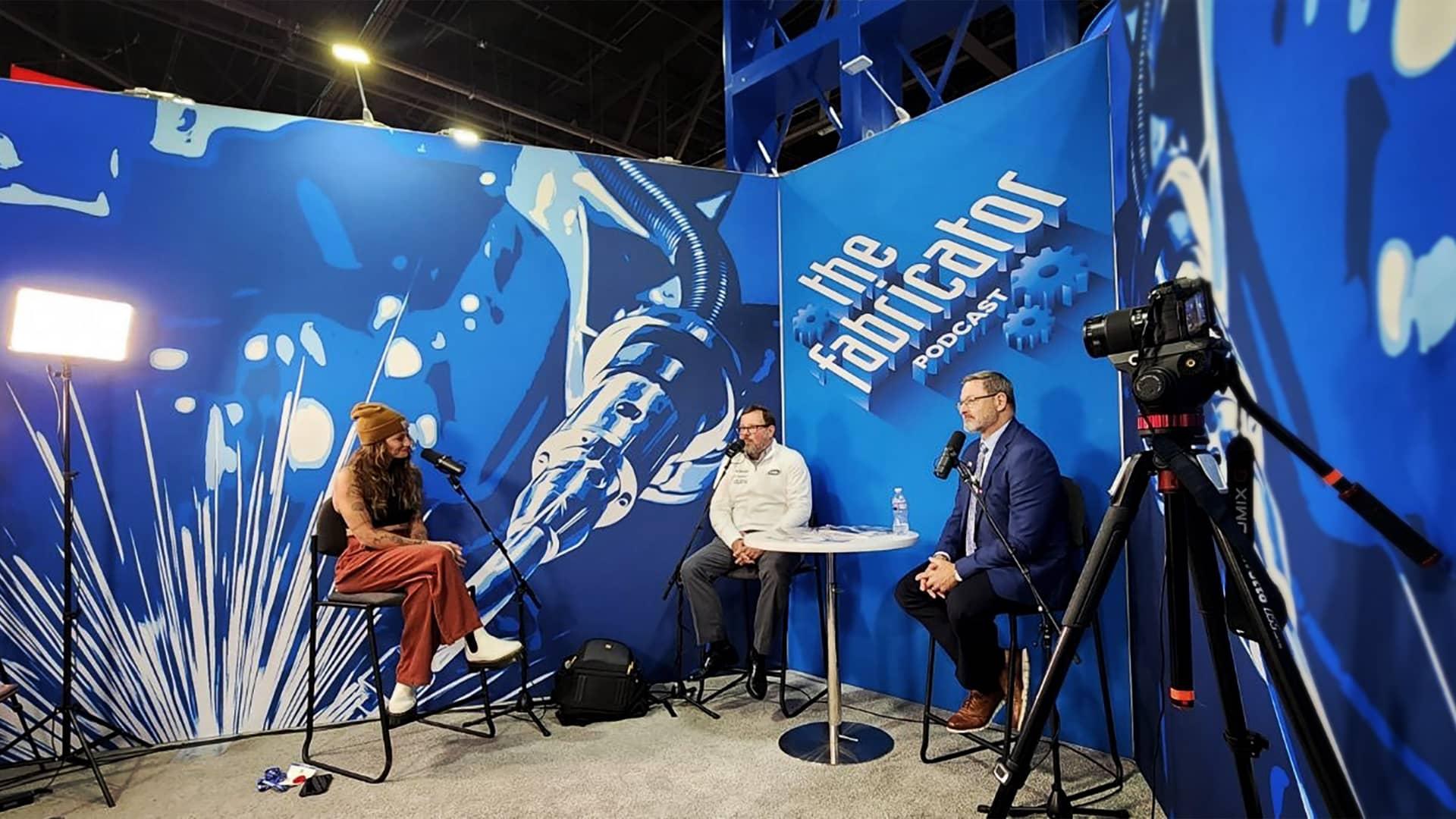
About This Podcast
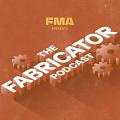
All Episodes
-
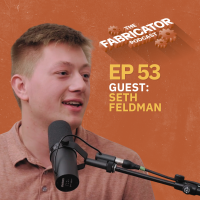 Ep. 053
Ep. 053 -
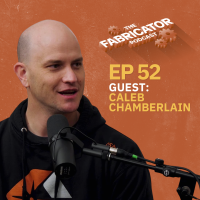 Ep. 052
Ep. 052 -
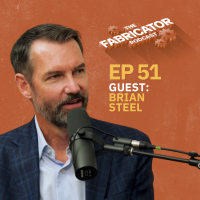 Ep. 051
Ep. 051 -
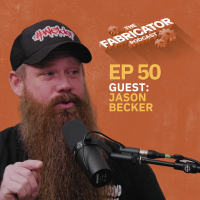 Ep. 050
Ep. 050 -
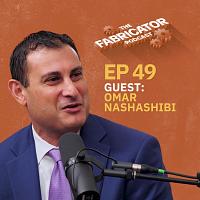 Ep. 049
Ep. 049 -
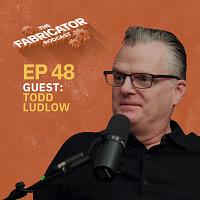 Ep. 048
Ep. 048 -
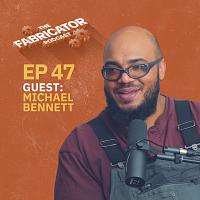 Ep. 047Scrap metal art and overcoming obstacles with Michael Bennett
Ep. 047Scrap metal art and overcoming obstacles with Michael Bennett -
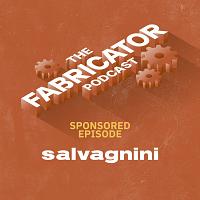 Bonus
Bonus -
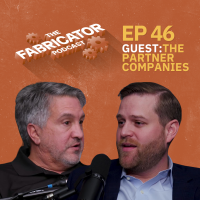 Ep. 046
Ep. 046 -
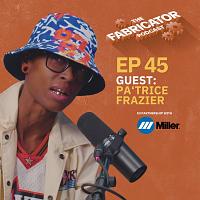 Ep. 045
Ep. 045 -
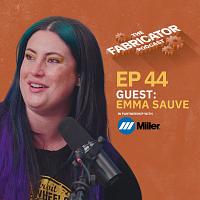 Ep. 044
Ep. 044 -
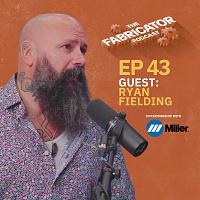 Ep. 043
Ep. 043 -
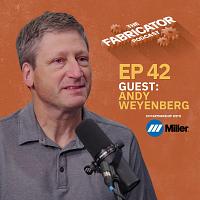 Ep. 042
Ep. 042 -
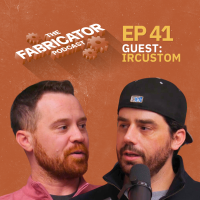 Ep. 041
Ep. 041 -
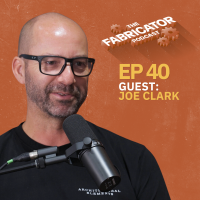 Ep. 040
Ep. 040 -
 Ep. 039
Ep. 039 -
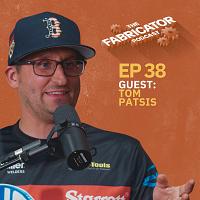 Ep. 038
Ep. 038 -
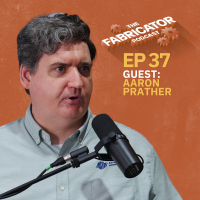 Ep. 037
Ep. 037 -
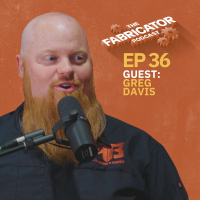 Ep. 036
Ep. 036 -
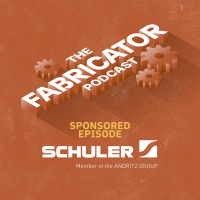 Bonus
Bonus -
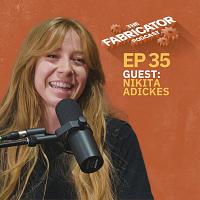 Ep. 035
Ep. 035 -
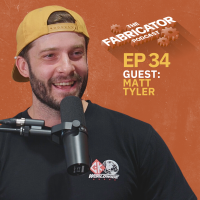 Ep. 034
Ep. 034 -
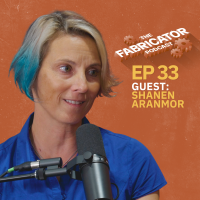 Ep. 033
Ep. 033 -
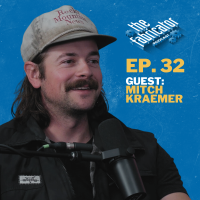 Ep. 032
Ep. 032 -
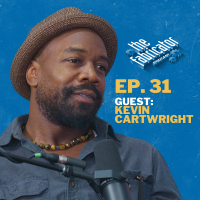 Ep. 031
Ep. 031
























